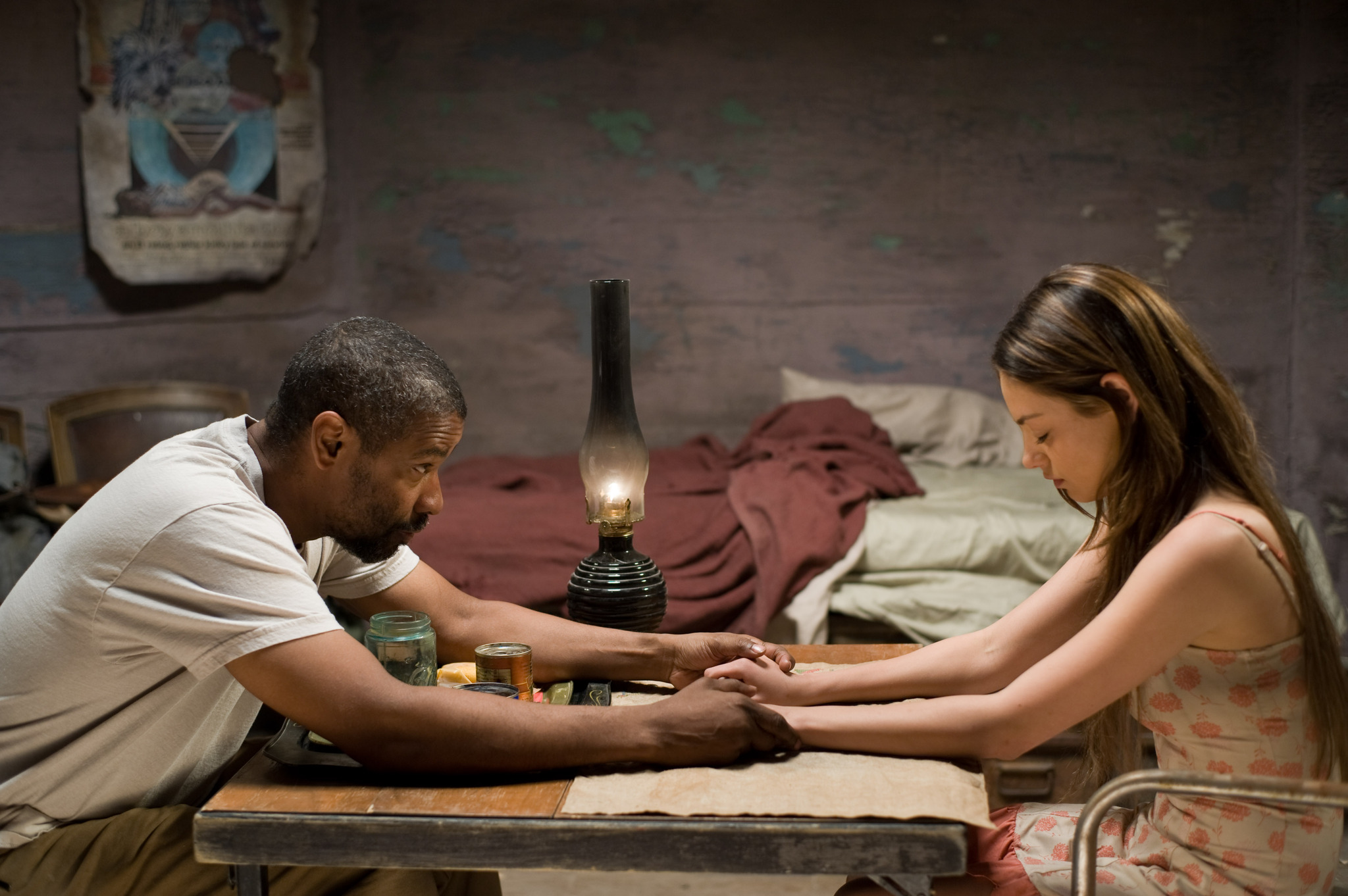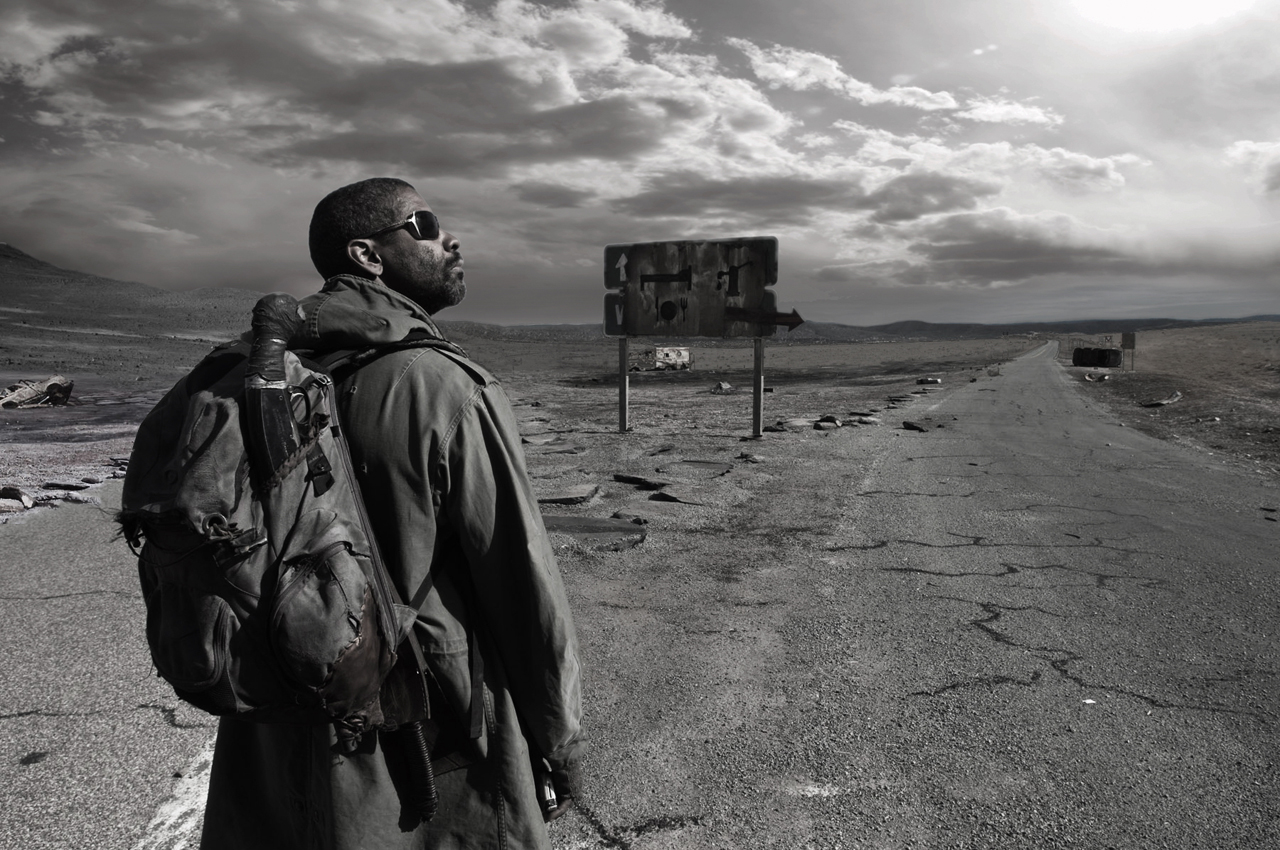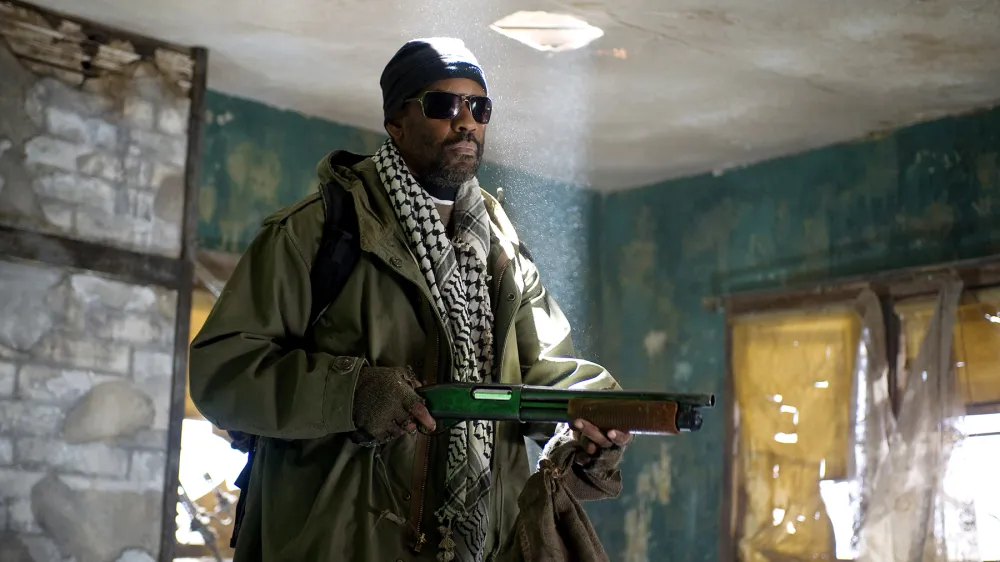🎬 The Book of Eli (2010)

The Book of Eli (2010) Review: A Post-Apocalyptic Journey of Faith and Survival
The Book of Eli (2010), directed by the Hughes Brothers, is a gripping post-apocalyptic thriller that combines action, drama, and deep philosophical themes. Starring Denzel Washington as Eli, a lone wanderer on a mission to protect a sacred book that could hold the key to humanity’s future, the film explores themes of faith, survival, and the power of knowledge in a world ravaged by destruction. With its compelling performances, stunning cinematography, and thought-provoking narrative, The Book of Eli stands as one of the most distinctive post-apocalyptic films of the 21st century.
Plot Overview: A Journey to Protect Knowledge in a Broken World
Set in a desolate future where the Earth has been devastated by a catastrophic event, The Book of Eli follows Eli, a man traveling across the barren wasteland of America. Armed with a Bible, Eli believes he is on a divine mission to protect and deliver the last remaining copy of the sacred text to a distant location. Along the way, he encounters various dangers, from ruthless gangs to a power-hungry warlord, Carnegie (Gary Oldman), who seeks to obtain the book for his own purposes.
Eli’s journey is fraught with peril, but his resolve to protect the book never wavers. Along the way, he befriends Solara (Mila Kunis), a young woman seeking to escape the oppressive world she has known. As Eli and Solara journey together, they must confront not only the threats of the post-apocalyptic world but also the deeper questions about the nature of faith, survival, and the importance of knowledge in rebuilding civilization.
Denzel Washington’s Powerful Performance as Eli
At the heart of The Book of Eli is Denzel Washington’s unforgettable performance as the titular character. Eli is a man of few words but immense strength and determination, a man who believes in his mission with unwavering faith. Washington brings a sense of gravitas and depth to the character, making Eli a compelling figure whose commitment to his cause drives the narrative forward. His portrayal of a man who must grapple with the moral implications of his mission in a world without rules is both nuanced and powerful.
Washington’s chemistry with Mila Kunis, who plays Solara, is another highlight of the film. Their dynamic evolves from one of survival to mutual respect, with Eli serving as a mentor of sorts to Solara, teaching her the ways of the world as they embark on their journey. Washington’s ability to portray both strength and vulnerability makes Eli one of the most memorable characters in post-apocalyptic cinema.
Gary Oldman as the Villainous Carnegie
Gary Oldman delivers a stellar performance as Carnegie, the film’s primary antagonist. Carnegie is a ruthless, power-hungry warlord who believes that obtaining the Bible will grant him the ability to control what remains of humanity. Oldman masterfully portrays a man driven by obsession and greed, and his portrayal of Carnegie adds a chilling element to the film. His character is not just a villain for the sake of conflict but a complex figure who represents the dangers of using religion as a tool for control in a broken society.
The contrast between Eli and Carnegie is stark—Eli believes in the power of the written word to inspire and lead, while Carnegie views the Bible as a means to manipulate others and gain power. Oldman’s performance adds layers to the film, making the conflict between these two characters not just physical but philosophical as well.
The Post-Apocalyptic Setting: A Desolate World of Survival
One of the most striking aspects of The Book of Eli is its bleak and desolate portrayal of a post-apocalyptic world. The film’s setting is a barren landscape, with dust storms, abandoned cities, and decimated forests. The cinematography by Don Burgess captures the desolation and hopelessness of the environment, giving the film a distinctive, almost dreamlike quality. The color palette is muted, with sepia tones and washed-out hues, creating a world that feels as though it has been stripped of all life and vibrancy.
The wasteland is populated by survivors who have adapted to the harsh conditions, and the lack of resources has led to the breakdown of society. The film does an excellent job of showing the moral and physical decay of the world, with bands of marauding scavengers and warlords fighting for dominance. In this world, humanity is reduced to its most primal instincts, and the struggle for survival is constant.
Despite the desolation, the film offers glimpses of hope, largely through Eli’s mission and his unwavering belief in the power of the Bible. The contrast between the bleakness of the world and Eli’s sense of purpose adds emotional depth to the film, turning his journey into a symbol of resilience and faith.
Themes of Faith and Knowledge: The Power of the Bible
At its core, The Book of Eli is a story about the power of knowledge and faith in the face of overwhelming adversity. The Bible, Eli’s sacred possession, represents not only religious faith but also the preservation of human history and wisdom. In a world where books have been destroyed and knowledge has been lost, the Bible becomes a beacon of hope—a reminder of the past and a guide for rebuilding the future.
Eli’s belief that he is carrying out a divine mission to protect the Bible is central to the film’s themes. His journey is not just physical; it is also spiritual, as he grapples with the meaning of his mission and the sacrifices he must make along the way. The film explores how faith can provide strength in times of darkness, but it also raises questions about the use of religious power in a broken world. Carnegie’s desire to possess the Bible for control reflects the dangers of using religion as a means of manipulation, underscoring the film’s message about the importance of preserving knowledge and wisdom.
The film’s examination of faith is not confined to the religious aspect alone. It also touches on the concept of faith in humanity and in one’s own purpose. Eli’s journey is a metaphor for the search for meaning in a world that has lost its way, and his unwavering belief in his mission serves as a source of inspiration and resilience.
Cinematography and Visual Style: Creating a Bleak Yet Beautiful World
The cinematography in The Book of Eli is one of its most distinctive features. The film’s desolate world is captured with haunting beauty, thanks to the work of cinematographer Don Burgess. The color grading of the film contributes to its apocalyptic tone, with muted browns, grays, and greens dominating the screen. The use of light and shadow also enhances the film’s mood, with long stretches of darkness contrasting with moments of illumination that symbolize hope and faith.
The action scenes, while sparse, are choreographed effectively, with Eli’s combat skills showcased in tight, fast-paced sequences that emphasize his efficiency and precision. These moments of action serve to break up the film’s otherwise contemplative pace, providing a welcome adrenaline rush while reinforcing Eli’s role as a protector and warrior.
One of the standout scenes in the film involves a dramatic revelation near the film’s conclusion, where the true power of the Bible is revealed. This moment is not only a pivotal plot twist but also a moment of emotional and spiritual significance, underscoring the central themes of faith, knowledge, and the human spirit.

Final Thoughts: A Thought-Provoking and Action-Packed Thriller
In conclusion, The Book of Eli (2010) is a post-apocalyptic film that successfully combines action, drama, and philosophical depth. With standout performances from Denzel Washington and Gary Oldman, the film explores themes of faith, survival, and the preservation of knowledge in a ravaged world. Its gripping storyline, stunning cinematography, and exploration of complex moral questions make it more than just a typical action film.
For fans of post-apocalyptic thrillers, The Book of Eli offers a unique and thought-provoking experience that goes beyond mere survival and combat. It asks deeper questions about the role of religion, knowledge, and purpose in rebuilding a fractured world, making it a must-watch for those seeking an action-packed yet introspective cinematic journey.











